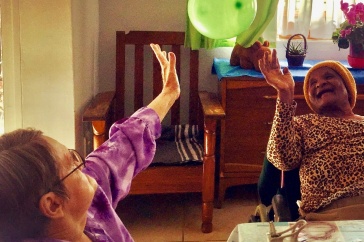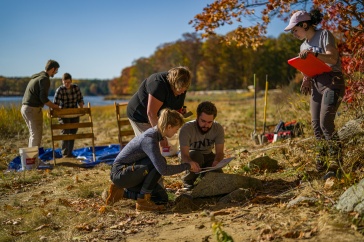Three professors will be joing the Department of Anthropology in the fall of 2016:

Dr. Casey Golomski, Assistant Professor of Anthropology, is a cultural and medical anthropologist working in sub Saharan Africa. His research explores the interplay of medicine and religion in social reproduction across the life course. Topically, he is interested in healthcare and healing, aging, death and dying, the body, ritual and religion, care, work, value, and risk, and is happy to advise students who have interests in these areas or in African and its Diasporic post-colonial cultures and history. In his professional service, he is an associate editor for the African Journal of AIDS Research and a board member for the Northeast Workshop on Southern Africa. Dr. Golomski's research has been published in Material Religion, Social Dynamics, and American Ethnologist. He recently completed a book on funerals as sites of cultural change due to AIDS in Swaziland and is beginning new work on eldercare, race and dependency in South Africa. Before coming to UNH, he earned a PhD from Brandeis University (2013) and a BA summa cum laude from St. Norbert College (2006) and was an Associate Lecturer at UMass Boston and a University Research Council Postdoctoral Fellow at the University of the Witwatersrand in Johannesburg.
Dr Golomski will be teaching ANTH 797: Anthropology of Aging and the Life Course Fall 2016 on Tuesdays & Thursdays 12:40-2pm.

Smita Lahiri is a socio-cultural anthropologist whose interests include space and place, nationalism and globalization, and the mobilization of “publics” via social imaginings, face-to-face gatherings, and mediated encounters. Trained as a specialist of Southeast Asia at Cornell, where she received her Ph.D. in 2002, Smita has been following cultural politics in the Philippines since 1997. She is currently writing a book on the diverse utopian perspectives engendered by Mt. Banahaw—an extinct volcano located just beyond the periphery of Metro Manila—amongst a wide swathe of Filipinos: folk-Catholic pilgrims, mystical practitioners, makers and seekers of national heritage, environmental justice activists, and rural households at the margins of subsistence. In 2007, Smita began researching language ideology and language use in South Asia. Her next project addresses the evolution of the English language in India from its colonial origins into a language of national modernity, globalized urbanity, and political potency. Before coming to UNH, Smita was a member of the Department of Anthropology at Harvard University (2002-2012)
Dr Smita will be teaching ANTH 500.E01 Peoples and Cultures of Southeast Asia on Mondays/Wednesdays/Fridays from 12:10-1pm.

Allysha Powanda Winburn comes to the UNH Department of Anthropology from the University of Florida (UF), where she spent five years as a forensic anthropology analyst at UF’s C.A. Pound Human Identification Laboratory. A Yale- and New York University-educated archaeologist and biological anthropologist, she worked from 2009-2014 as a forensic anthropologist at the Joint POW/MIA Accounting Command, where she led archaeological recovery missions to Germany, Laos, and Vietnam in search of the remains of fallen U.S. service members. She also worked with the New York City Office of Chief Medical Examiner on the renewed (2007) recovery of human remains from the 9/11World Trade Center disaster. Allysha is currently completing her doctoral dissertation at UF, investigating contributions of age, activity, and body mass to progressive acetabular changes and osteoarthritis in a modern U.S. skeletal sample. Her research publications evaluate error and uncertainty in forensic anthropological age and ancestry estimation, address issues of objectivity in forensic science, and explore the cultural contexts of the human remains analyzed by forensic anthropologists. Her ongoing research on Afro-Caribbean ritual use of human remains utilizes multi-regional comparisons to identify biocultural and taphonomic patterns observed in ritual assemblages, and evaluates the potential for stable isotopic analyses to discriminate between ritual remains originating from the U.S. and the Caribbean.
Pr Powanda will be teaching ANTH 597 Special Topic/Introduction to Forensic Anthropology on Mondays and Wednesdays from 9:40-11am.
-
Written By:
Carolyn Stolzenburg | Anthropology | cas24@cisunix.unh.edu | (603) 862-1864



















































